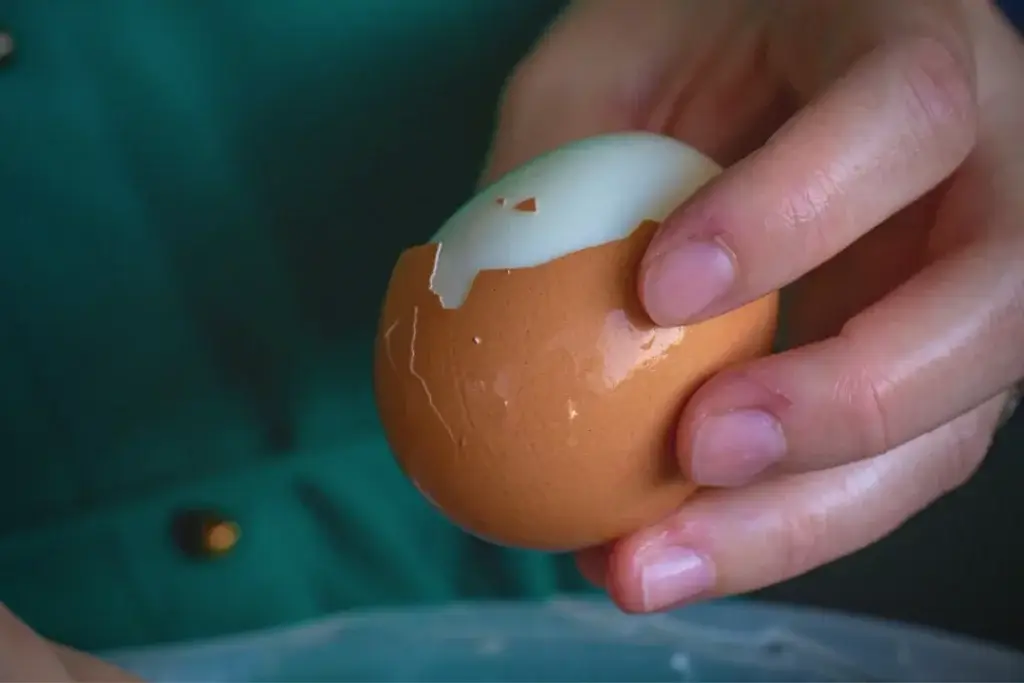As a source of protein and nutrients, eggs are quite popular, so they are widely consumed. They may be included in every meal, regardless of whether you’re preparing breakfast, lunch, or supper. You’ve come to the right place if you’ve been wondering how to freeze eggs.
Eggs may be frozen, but it’s crucial to know which sort of egg would work best for your recipe. When freezing eggs, you may use three distinct types of eggs: whole eggs, only whites, and just yolks. Whole eggs are the most common form of egg used in baking. Whichever one you pick will be determined by the requirements of your future recipe.
If your recipe asks for egg whites, go ahead and separate the whites from the yolks before storing them in separate storage containers for future use. You may rest assured that all of your components will be ready for use when required again in a week or two! It’s also quite simple to freeze eggs!
Table of Contents
Can You Freeze Eggs?
Yes, it is possible to freeze eggs. To maintain freshness: eggs should be used within four months of being frozen. They can be kept for up to a year.
Many individuals find themselves with extra egg whites or yolks after completing a dish that only calls for one of the two, or they find themselves tossing away unneeded eggs after the box’s expiration date has passed.
By freezing eggs, you may avoid food waste in this situation. However, to keep the eggs safe, it is necessary to adhere to the following requirements.
Freezing Whole Eggs:

The process of freezing entire eggs is straightforward. You’ll need a mixing bowl, ice cube trays, a mixer, and, of course, your eggs to complete this recipe. Follow these straightforward instructions for freezing your eggs:
Step 1: Break the eggs open and place them in a large mixing dish.
Step 2: Gently fold in the egg whites and yolks until they are barely combined, but not completely combined. Be cautious not to put more air into the mixture than is necessary.
Step 3: Fill the ice cube tray halfway with the beaten egg mixture. This enables you to freeze portions that are roughly half the size of an egg or smaller.
Step 4: Put the ice cube tray in the freezer for several hours or until the eggs are completely frozen. Removing the egg “cubes” off the tray and placing them in a zip-lock plastic bag will keep them fresh for a long time.
However, you cannot freeze eggs in their shells or with their yolks intact, nor can you freeze eggs with their whites intact. As a result, you will be unable to utilize your frozen eggs to prepare a breakfast of eggs sunny-side up. You may, however, use them in nearly any other recipe, like omelets and scrambled eggs, if you so want.
Freezing Egg Whites:

Egg whites are an absolutely important item in the kitchen, especially if you enjoy putting together sweets on the spur of the moment. They’re a fantastic method to lighten up mousses, and they’re also a key element in meringues and macarons, among other desserts.
So, what should you do with the leftover egg white when a recipe calls for one egg yolk? Well, of course, you freeze it to keep it from melting!
It’s not that difficult to freeze egg whites. Follow the instructions outlined below:
Step 1: Fill a large jug halfway with all of the egg whites you have. The egg whites should not be whisked, and any other ingredients such as sugar or lemon juice should not be added to them.
Step 2: The egg whites are now in a large mixing bowl; pour them into a muffin pan or onto an ice cube tray, depending on how many portions you want to serve in each section.
Step 3: Put the tray in the freezer for a few minutes to flash freeze it.
Step 4: Once the egg whites are frozen, take the tray from the freezer and place them in a freezer-safe bag.
Freezing Egg Yolks:

When it comes to freezing yolks, you will have to put in a bit more effort than you will when freezing egg whites. If you freeze egg yolks under their own, there is indeed a potential that a gel can form around the outside of the yolks, which can make them rather sticky to the touch.
As a result, if you wish to freeze egg yolks, follow these instructions efficiently:
Step 1: Fill a jug halfway with your egg yolks and softly whisk them together until they are split up. For the following step, pour the liquid into a jug with ml measures printed on the side.
Step 2: Use one teaspoon of sugar for every 150 milliliters of egg yolks if you’re making a dessert out of your leftovers. Instead of sugar, use half a teaspoon of salt for every 150ml of egg yolks if you’re using your egg yolks to make anything savory.
Step 3: After that, you may pour your egg yolks in a jar (like we did above for the egg whites), flash freeze them, and then pop them out of the container to keep for a lengthy period in the refrigerator.
Is it Possible to Freeze a Hard-Boiled Egg?
In the case of a completely hard-boiled egg frozen, the egg whites will be mushy and watery when thawed and will be unappealing. So, no, you shouldn’t put a hard-cooked egg in the freezer. Egg yolks can be stored and used for toppings and garnishes later, but they must first be prepared for freezing.
Freezing Hard-Boiled Egg:

For example, if you choose to use the egg whites for the next recipe and then cook and freeze the yolks to serve on top of salads or as a topping for other dishes, you can take out the whites and cook only the yolks separately.
Step 1: Pour enough water into a saucepan to come at least 1 inch well above yolks and carefully set the yolks in a layer on top of the water.
Step 2: Bring the water to a boil while covering it with a lid.
Step 3: Turn off the heat and set aside the yolks in hot water for around 12 minutes as the water is warming them.
Step 4: Drain thoroughly and package the yolks for freezing when they have been removed from the pan using a slotted spoon.
Is it Possible to Freeze Scrambled Eggs?
Yes, it is possible to freeze scrambled eggs! You may freeze scrambled eggs either uncooked or cooked, and there are several simple techniques for doing so listed below. This is perfect for meal-prepping morning meals!
Freezing Scrambled Eggs:

Step 1: In a mixing dish, whisk together raw eggs.
Step 2: For every cup of raw eggs, one teaspoon of salt should be used.
Step 3: Place the eggs in a muffin pan or ice cube tray and cover with plastic wrap to freeze.
Step 4: Remove the eggs from the containers in which they were frozen and place them in a freezer bag labeled with the date and time you want to use them.
Step 5: Within one year after freezing, you may defrost and cook as usual.
Freezing Cooked Scrambled Eggs:

Step 1: Allow the scrambled eggs to cool once they have been cooked.
Step 2: Using plastic wrap, wrap the dish securely, pushing it down slightly to eliminate excess air.
Step 3: Wrap tightly with aluminum foil or place in freezer bags.
Step 4: Place them in a freezer bag with a label on it.
Step 5: It is best to thaw and reheat within a year of the first freezing.
Do Eggs Keep Well in the Freezer?

This is a difficult subject to answer because they have a good ability to freeze. Whatever it is, it all boils down to how they are frozen, what condition they are in, and how long they have been frozen.
It is unlikely that you will detect a significant difference in the texture of the eggs because you will normally beat them either before or after freezing.
However, when you freeze entire eggs, egg whites, or egg yolks, the good news is that the flavor should remain essentially the same. However, cooked egg items, such as scrambled eggs, will lose their texture and flavor if they are frozen.
What Is the Best Way to Defrost Eggs?
When you’re ready to use them, place them in the refrigerator to thaw out before using them. It’s truly as straightforward as that. This will help them to remain cold enough while thawing so that they do not spoil. Thawing frozen eggs at room temperature is not recommended.
To ensure that you know what to use and when to mark your bag or container with the number of eggs in it and whether or not you added spices to them.
How Long Do Frozen Eggs Keep Their Freshness?

Chicken eggs may be stored in the freezer for up to a year. These characteristics make them an excellent element to have on hand in case of an emergency.
You may freeze whole eggs, or you can separate the yolks and whites and freeze them individually. Alternatively, you may freeze your eggs in a variety of containers. It is possible to utilize ice cube trays or containers for this. It is entirely up to you which strategy you will choose.
What Are the Advantages of Freezing Your Eggs?
- This is a good way to stock up on eggs while on sale or a fantastic way to use them up if you have many eggs that are about to expire. Not worry if you notice deals on eggs in the grocery store. You are now free to go insane. So simple, yet so effective! You may be able to save money by doing so.
- When using frozen eggs, make sure you have plenty on hand. Nothing is more frustrating than getting ready to bake a cake and finding you’re missing an egg or two!
- Preparing eggs for baking or cooking ahead of time will save you time and effort. Small measures, such as freezing eggs, may often add to significant time savings for meal preparation!
- Raw eggs can take up a significant amount of space in the refrigerator. Due to freezing, they will be moved from the fridge to the freezer, saving you a significant amount of room!
Extra Tips on How to Freeze Eggs:
Now that you know how to freeze eggs, here are our four must-read guidelines that we highly urge you to follow to get the greatest outcomes when freezing eggs:
Never Freeze in the Shell:
Cracks can emerge when eggs are frozen in their shells, despite being usually slight. Air can get via those small, minute flaws, allowing germs to grow in your eggshells without you being aware of it.
Preserve in Portion Sizes:
If you want to avoid having to refreeze or trash eggs that you won’t use, consider freezing them in pieces so that you may thaw them one at a time and save time.
Yolks Should Be Prepared With Salt and Sugar:
A gel can form when the yolk is frozen, which is why adding some salt (for savory yolks) or sugar (for sweet yolks) is an excellent approach to avoid this gel from forming.
Don’t Put Anything Else on Top of the White:
Egg whites, on the other hand, have the opposite effect. It is unnecessary to add anything to the egg whites, such as sugar, confectioners’ sugar, or vinegar. Instead, once the egg whites have frozen, fold them into the mixture.
Frequently Asked Questions:
What is the shelf life of fresh eggs in the refrigerator?
Fresh eggs will keep in the refrigerator for 3–5 weeks and approximately one year in the freezer. Please keep them in their original cartons, away from the refrigerator’s door, to maintain the quality.
Is it ok to consume eggs that are more than two months old?
Yes, you will likely be able to consume that expired egg but never look back. Eggs, if kept refrigerated, will normally last for many weeks after their expiry date. As per the USDA, the best storage term for raw eggs in its shells is 3 to 5 weeks, regardless of when that date is set.
Can I bake a cake with eggs that are over their expiration date?
It emphasized that eggs should be boiled before consumption and should not be consumed after their expiration dates. “Eggs can be consumed after their best before date, provided that they are well cooked until both yolk and white are firm, or if they are used in recipes where they will be completely cooked, such as a cake,” according to the revised guidance.
Is it possible to freeze eggs in their shells?
Nope! The dangers of freezing eggs in their shells have already been discussed above a little more thoroughly. Nevertheless, even if you successfully freeze your eggs in their shells, they will be extremely fragile once they have been frozen due to the presence of germs in the shells. As a result, we advise freezing the eggs only as a liquid rather than as a solid.
Wrapping it Up:
To freeze eggs, place them in an airtight freezer-safe container or zip-top bag and seal the container or bag tightly. You may then mark the containers with the date and quantity of eggs that you have frozen to keep track of how long the eggs have been frozen for reference.
Omelets scrambled egg burritos, quiches, or frittatas using frozen eggs is the greatest method to use them once they have been frozen. Enjoy your meal while it’s still fresh since these tiny gentlemen only survive six months in the fridge before their quality begins to deteriorate dramatically.







